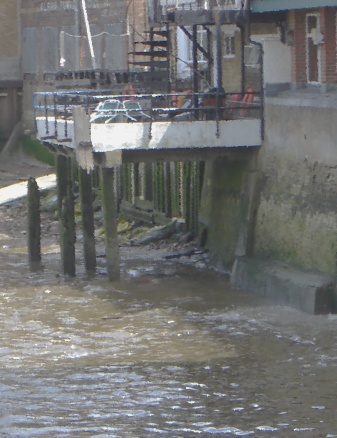
He makes a distinction between "grey technology" based on physics and chemistry, and "green technology" based on biology. He thinks the last few thousand years will be seen as a relatively brief era during which grey technology was the cutting-edge thing. Before that, green technology — agriculture and animal husbandry " reigned supreme. Tampering with genomes was the route to progress. And now green technology is beginning to retake its central role.
He notes that his definition of "green" to include any technology based on biology differs from that of most "greens".
He notes the dangers and responsibilities of biotechnology, but he doesn't flinch from them:
After we have explored this route to the end, when we have created new forests of black-leaved plants that can use sunlight ten times more efficiently than natural plants, we shall be confronted by a new set of environmental problems. Who shall be allowed to grow the black-leaved plants? Will black-leaved plants remain an artificially maintained cultivar, or will they invade and permanently change the natural ecology? What shall we do with the silicon trash that these plants leave behind them? Shall we be able to design a whole ecology of silicon-eating microbes and fungi and earthworms to keep the black-leaved plants in balance with the rest of nature and to recycle their silicon? The twenty-first century will bring us powerful new tools of genetic engineering with which to manipulate our farms and forests. With the new tools will come new questions and new responsibilities.
He optimistically thinks that in the end, biotechnology could spell an end to rural poverty, and a decline in the relative importance of cities. More plausibly (to me), he notes it could usher in a vast growth of biodiversity, as new species fill unforeseen niches.
Lots of ideas per square inch here! They're not all developed thoroughly, and some could be tragically wrong, but we need to start thinking about this stuff.
A fun piece on the adaptability of humans, but not enough detail for my taste:
Today the Russians planted a flag on the Arctic seabed, trying to claim a large area including the North Pole. The act of planting a flag has had no legal status for many decades.
Thom Yorke of Radiohead had this to say about their song Like Spinning Plates:
I focus on the most imminent ecological issues. You know, there are so many scenarios on the horizon at the moment that will result in mass suffering. For the most part in the West we worship a certain type of economics, which is like worshipping a false god. It's a theory about economics which will collapse, and the sooner people realize that, the quicker they will be able to understand how we should be engaging with the world around us. To me, it's like spinning plates: I'm not sure how long we can keep this trick going.The last couple days I've been holed up at 46 Azof St. in Greenwich, finishing up my Abel symposium talk.
It took me a while to enjoy them here coming straight from the glories of Greece, but the docklands of Greenwich have a gritty charm:

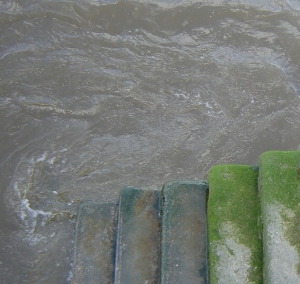
Once this part of the Thames was bustling with activity
and infested with
crime. It's very romantic, at least in retrospect.
August 3, 2007
From The Wasteland by T. S. Eliot:
Here's view along Greenwich Reach, on the south shore of the Thames:
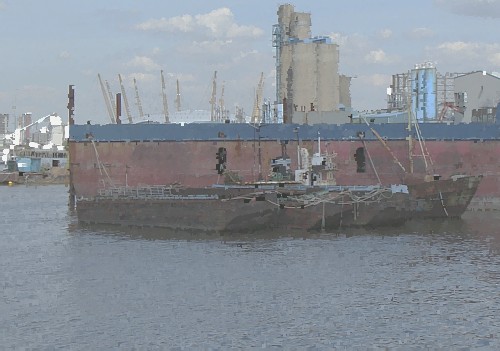
In front you see three rusty boats against an anonymous metal building.
In the middle background, the brownish cylinders poking up are grain silos owned by the Belgian wheat-starch and health foods company Amylum. They emit a peculiar malty smell, a bit like a brewery. When the wind is right, the scent blows all the way to our house.
Slightly to the left, also in the background, you'll see a light-colored dome with mast-like protrusions. This is the Millennium Dome, located atop the North Greenwich tube station. Built by the British government, this was a money-losing white elephant until it was privatized, redeveloped and (for some unfathomable reason) called the The O2. Now they hold concerts there, which completely overwhelm the local buses when the crowds come out. It looks incongruous, as if a confused alien starship had landed amid the docklands.
From the London Thames Gateway Forum:
Established in the 1700s, the industrial area on the east side of the Greenwich peninsula expanded down river during the 1800s. However, the flood-prone north remained undeveloped marsh until the industrial development of the late 19th century when, with good access to the river for importing and exporting goods, it became a thriving home to rope making, cable making, and the manufacture of soap, linoleum, gas and other industries. A site where a gunpowder store once stood was acquired in 1829 by the Enderby family, tanners from Bermondsey who later made money from a white lead manufacturing process and then married into the whaling trade. On this site they built Enderby's Hemp Rope Works, with a ropewalk and a factory making sails and cordage. In the 1830s they built Enderby House on the riverside. In the 1850s the site was bought by Glass Elliot, a pioneering company in the new submarine cable industry, and here the first cables to span the Atlantic were made. Submarine cables were made and cable-laying ships moored at Enderby's Wharf until 1975, and the site is still used today by Alcatel Submarine Networks which continues to manufacture international cable.
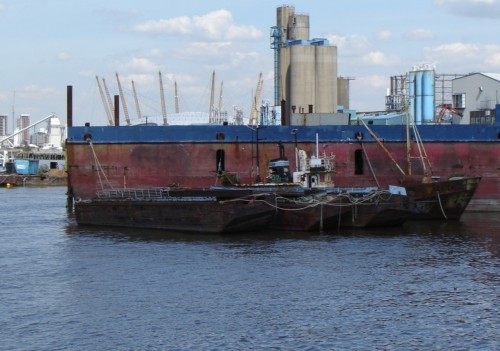
Why play up the melancholy atmosphere? Marshes and docks have that quality to start with, and the place names around here bring it out: the Isle of Dogs, Mudchute, Bugsby's Marshes, and so on. It's not just me:
When G.R. Sims was researching his book Off The Track in London, in 1911, one hidden corner he visited was the Isle of Dogs — and the author didn't like what he saw. "Long, dreary roads and desolate patches of black earth. In the centre lies desolation land, a vast expanse of dismal waste ground with a grim fringe of black wharves and towering chimneys, belching volumes of smoke into a lowering sky, spanned by the soot-dripping arches of the railway. Across the waste comes a lonely little lad, who wheels his sister in a perambulator roughly constructed out of a sugar box. They are the only human beings in sight".But, I must admit I'm in the midst of reading this book:
On the 8th I gave a talk on higher gauge theory and elliptic cohomology. I wrote up my impressions of this conference in week255 of This Week's Finds.
As for Oslo, it was so bloody expensive that any other impression was more or less overwhelmed — especially since my bank card expired and I was left struggling for cash.
A fellow from Stockholm said Swedes are to Norway as Mexicans are to the US: a third of the folks working at in restaurant and bars in Oslo are from Sweden. It's the wage differential (or maybe the exchange rate) that draws them. I asked about the underlying cause, and he just said there were a lot of rich people in Norway. I wonder if it's really that simple.
August 10, 2007
Back from Oslo!
After some serious egging-on by Bruce Bartlett, Blake Stacey has launched a prototype
math
journal wiki, which he tentatively named MathSciJournalWiki. It's
all part of the general revulsion against cloaking
by academic publishers — the latest of many sneaky tricks they've been
pulling.
August 12, 2007
Watching Zorro got me all excited about the revolutionary
potential of this math journal wiki. The next day I wrote:
I had a bit of inspiration last night while watching the movie Zorro. Until the end, when it degenerates into a nasty all-out brawl punctuated by massive explosions, this movie is pretty inspirational. You get the feeling that the downtrodden poor can indeed triumph over the corrupt scheming rich — and do it with panache and a sense of humor, while doing backflips and dodging bullets.We later settled on the name "Eureka! Science Journal Watch", which can be shortened to Eureka! when there's no danger of mixing it up with the vacuum cleaner company or the math magazine.Yeah, it's a bit hokey, but I decided the MathSciJournalWiki needs some of this idealistic flair to attract young mathematicians, awaken their sense of fair play, and incite them to rebel against the existing journal system, where the fat cats earn all the money while we do all the work.
For this, a name like 'MathSciJournalWiki' just won't do! It's too bland.
Neither will 'Math Journal Watch', which I'd modeled after 'Human Rights Watch'. Keeping an eye on the bad guys is a worthwhile endeavor, but it's fundamentally pessimistic — it suggests we'll be doing this forever.
Also, including the word 'Wiki' should be unnecessary. We can have a descriptive subtitle saying something like 'A wiki for open-access scholarly communication in math and physics' —or something like that. The name of the site should inspire! It should be quick and catchy. Someday putting 'Wiki' in the title of a wiki will seem like putting 'Book' in the title of a book.
So: we need a name that's inspiring and instantly recognizable by mathematicians and physicists (at least).
I asked my wife about this, because she's good at coming up with titles, and after some discussion she suggested: Eureka!
Archimedes is an inspiring figure for mathematicians and physicists, and scientists generally. He helped the city of Syracuse battle an encroaching empire. The word 'eureka', meaning 'I found it', suggests victory and triumph — but of a pure and noble sort.
The one catch, of course, is that Syracuse didn't win against the Roman Empire, and Archimedes was killed despite orders that he be spared. But even this works to our advantage, in a way. We can adorn our website with a picture of Archimedes drawing mathematical figures while a Roman soldier stands over him, breastplate adorned by the Elsevier logo.

Here's a bit of the story, as told by Plutarch. To set the stage: the Roman consul Marcellus decided to take Syracuse by siege...
When, therefore, the Romans assaulted the walls in two places at once, fear and consternation stupefied the Syracusans, believing that nothing was able to resist that violence and those forces. But when Archimedes began to ply his engines, he at once shot against the land forces all sorts of missile weapons, and immense masses of stone that came down with incredible noise and violence; against which no man could stand; for they knocked down those upon whom they fell in heaps, breaking all their ranks and files. In the meantime huge poles thrust out from the walls over the ships sunk some by the great weights which they let down from on high upon them; others they lifted up into the air by an iron hand or beak like a crane's beak and, when they had drawn them up by the prow, and set them on end upon the poop, they plunged them to the bottom of the sea; or else the ships, drawn by engines within, and whirled about, were dashed against steep rocks that stood jutting out under the walls, with great destruction of the soldiers that were aboard them. A ship was frequently lifted up to a great height in the air (a dreadful thing to behold), and was rolled to and fro, and kept swinging, until the mariners were all thrown out, when at length it was dashed against the rocks, or let fall. At the engine that Marcellus brought upon the bridge of ships, which was called Sambuca, from some resemblance it had to an instrument of music, while it was as yet approaching the wall, there was discharged a piece of rock of ten talents weight, then a second and a third, which, striking upon it with immense force and a noise like thunder, broke all its foundation to pieces, shook out all its fastenings, and completely dislodged it from the bridge.So Marcellus, doubtful what counsel to pursue, drew off his ships to a safer distance, and sounded a retreat to his forces on land. They then took a resolution of coming up under the walls, if it were possible, in the night; thinking that as Archimedes used ropes stretched at length in playing his engines, the soldiers would now be under the shot, and the darts would, for want of sufficient distance to throw them, fly over their heads without effect. But he, it appeared, had long before framed for such occasions engines accommodated to any distance, and shorter weapons; and had made numerous small openings in the walls, through which, with engines of a shorter range, unexpected blows were inflicted on the assailants. Thus, when they who thought to deceive the defenders came close up to the walls, instantly a shower of darts and other missile weapons was again cast upon them. And when stones came tumbling down perpendicularly upon their heads, and, as it were, the whole wall shot out arrows at them, they retired. And now, again, as they were going off, arrows and darts of a longer range inflicted a great slaughter among them, and their ships were driven one against another; while they themselves were not able to retaliate in any way. For Archimedes had provided and fixed most of his engines immediately under the wall; whence the Romans, seeing that indefinite mischief overwhelmed them from no visible means, began to think they were fighting with the gods.
Yet Marcellus escaped unhurt, and deriding his own artificers and engineers, "What," said he, "must we give up fighting with this geometrical Briareus, who plays pitch-and-toss with our ships, and, with the multitude of darts which he showers at a single moment upon us, really outdoes the hundred-handed giants of mythology?"
And, doubtless, the rest of the Syracusans were but the body of Archimedes' designs, one soul moving and governing all; for, laying aside all other arms, with this alone they infested the Romans and protected themselves. In fine, when such terror had seized upon the Romans that, if they did but see a little rope or a piece of wood from the wall, instantly crying out, that there it was again, Archimedes was about to let fly some engine at them, they turned their backs and fled, Marcellus desisted from conflicts and assaults, putting all his hope in a long siege.
Yet Archimedes possessed so high a spirit, so profound a soul, and such treasures of scientific knowledge, that though these inventions had now obtained him the renown of more than human sagacity, he yet would not deign to leave behind him any commentary or writing on such subjects; but, repudiating as sordid and ignoble the whole trade of engineering, and every sort of art that lends itself to mere use and profit, he placed his whole affection and ambition in those purer speculations where there can be no reference to the vulgar needs of life; studies, the superiority of which to all others is unquestioned, and in which the only doubt can be whether the beauty and grandeur of the subjects examined, of the precision and cogency of the methods and means of proof, most deserve our admiration. It is not possible to find in all geometry more difficult and intricate questions, or more simple and lucid explanations. Some ascribe this to his natural genius; while others think that incredible effort and toil produced these, to all appearances, easy and unlabored results. No amount of investigation of yours would succeed in attaining the proof, and yet, once seen, you immediately believe you would have discovered it; by so smooth and so rapid a path he leads you to the conclusion required.
It gives you a good visual sense of the "architectural" quality of Bach's music. It was made by a guy named Stephen Malinowski, who is apparently a buddy of Donald Knuth. You can see more of this sort of thing on his website.
But right now I'm grooving to this album, which is a catchy blend of flamenco, rumba and rap:
It would be easy to spot new additions to Wikipedia using colored text. I'm not sure what to do about deletions.
On another note: listen to Dick Cheney's surprisingly accurate predictions of what would happen in Iraq:
August 26, 2007
I'm back from Vienna, where I went a conference on Lie algebroids
and Poisson sigma models at the Erwin Schrödinger Institute.
I learned a lot there, and wrote up a little of this in
week256 of This Week's Finds.
I had a lot of good conversations with Urs Schreiber. I think
I understand his "tangent category" construction a bit
better now, and we had a good time at the Café Einstein,
puzzling out the relation between deformation quantization of Poisson
manifolds and 2d TQFTs.
August 27, 2007
Just a month ago
I visited the Temple of Zeus at Olympia, and its wonderful
museum full of antiquities. This week, the museum just barely survived
a bout of wildfires that have swept through Greece, a consequence of
the drought that's lasted since April, the
amazing heat wave
that's lasted for a month by now,
humidities of 10-15%, and perhaps some arson. I found this
story rather moving:
On a lesser scale: each time I've visited Greenwich, I've been
simultaneously tempted but scared by the chalkboards advertising
eel pies at
Goddard's Pie
House, a little shop in the busy heart of the town:
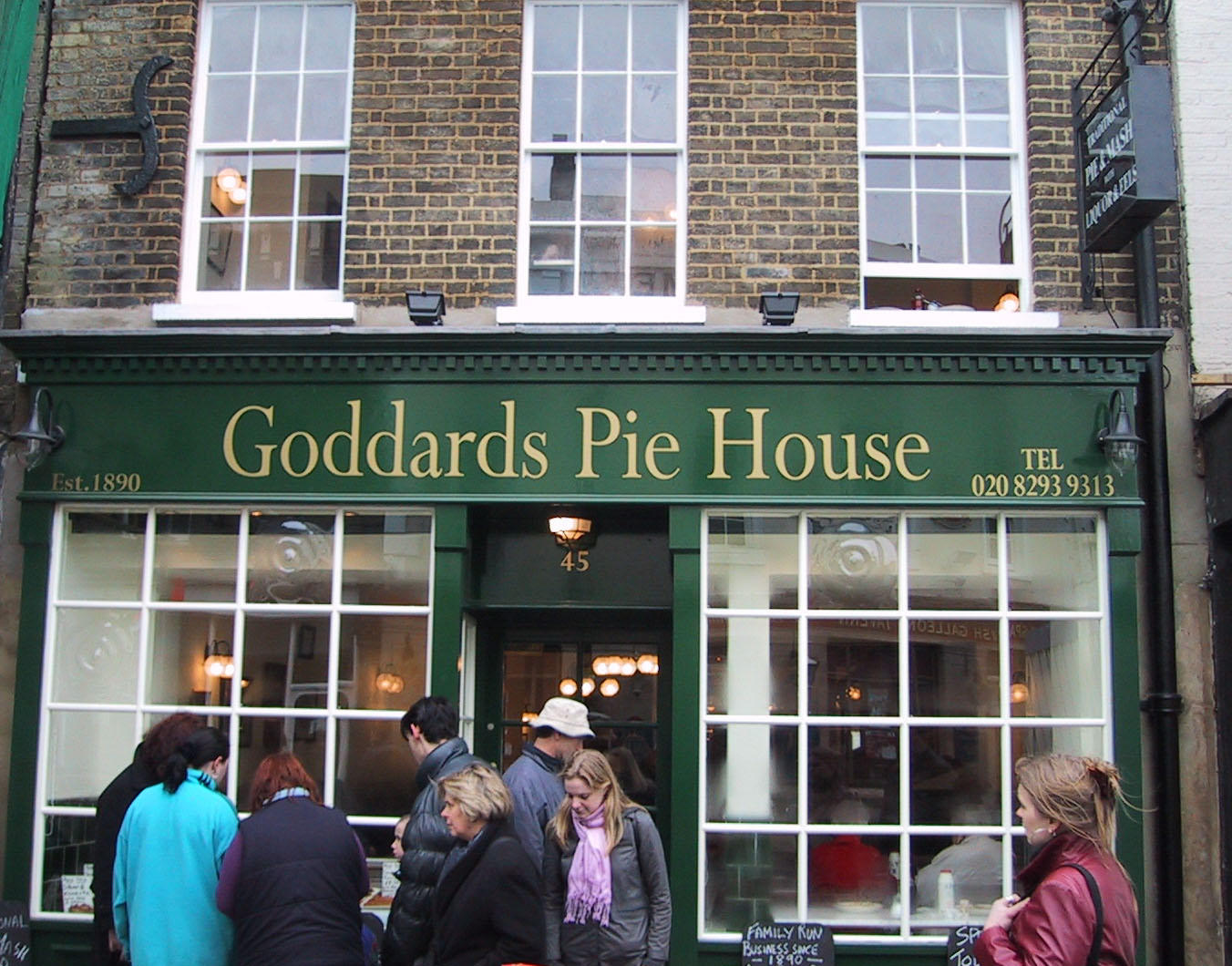
Goddard's website puts it a bit more romantically:
One of the major influences over the food traditions in London was the river Thames. It provided fish, both fresh and salt water, meat, vegetables and fruit were transported from around Britain, and spices and exotic foods from all over the world. The importance of the trading ships and the great markets like Billingsgate, Spitalfield and Smithfield can be seen in the names of roads in the East End, such as Bread Street, Milk Street and Fish Street.This time, after eating plenty of tasty eel in Shanghai, I was finally up for the challenge. So, Lisa and I looked around, trying to remember where the place was... but to no avail!Perhaps the most famous London dish is the Cockney speciality, jellied eels, caught locally and further out in the Thames Estuary. Made by boiling the eels with plenty of herbs and allowing small pieces to cool and form their own jelly (or by adding a helping portion of using gelatine). The taste is similar to that of pickled herring, but the softer texture can put people off.
The other great working class tradition is pie and mash. Historically, the pies were made from scraps of beef and vegetables, leftovers or from the local markets, under a pastry crust. The mashed potatoes were liberally covered in parsley gravy or "liquor".
It turns out that this shop, founded way back in 1890, closed on November 12, 2006. The owners could no longer resist the lure of a big offer to buy the property. In its place is just another anonymous chain store.
On the day Goddard's closed, the line stretched all the way to the Cutty
Sark! Here's an picture of the shop before it was renovated:
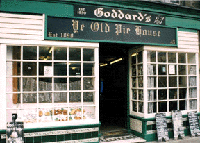
Luckily for me, the pie 'n' mash business is not dying, I can find eel pie somewhere if I put my mind to it — for example, at G. Kelly's, established in 1937. According to their website, the pie shops replaced an earlier tradition — the "pie men":
In 1851 the social historian, Henry Mayhew, decided to record the occupations of London's poor. This was published as "Mayhew's London". Among the many activities he noted were that of the "street pie men" and "the street-sellers of pea-soup and hot eels". The pie men sold meat, eel or fruit pies and would travel around the streets and visit taverns, summer fairs and the races. The eel sellers traded differently having stalls and stands in the street, many around Old Street. Around this time however, Mayhew writes that both the street pie men and the eel sellers. trade went into a decline. This was attributed to the establishment of the new penny-pie shops. Within a few years the street sellers had almost disappeared.I could also go to M. Manze's shops, which claim to be the oldest pie shops in London. They date back to 1902 — but now you can order your eel pies from them online!
In fact, eels have recently become fashionable in England, so I don't need to worry that the tradition of eel pie will die from lack of interest. The real threat to this tradition lies elsewhere. The population of eel in European waters has declined by as much as 99% since the 1970s!
Last year, eel were declared an endangered species. According to The Guardian:
Although they have never recovered the popularity they had at the end of the Second World War, when there were as many as 100 eel-and-pie shops in London alone, tourism has ensured the survival of dozens of pie-and-mash shops and jellied eel stalls in the capital's East End. A bowl of jellied eels from a stall costs about £1.50; a supermarket sells the same amount for about £2.20. Eels are also appearing on the menus of leading restaurants.Peter Gordon of The Providores, a central London restaurant that serves smoked eel, said: "Eel is extremely popular, especially with younger clients."
Rick Poole, who runs three pie-and-mash shops in south London, said: "We still sell all the eels we can get hold of. They are still very popular with young people as well as the older generation. We wouldn't want to see any drop in supply."
The slump in stocks of the European eel has been one of the most severe and puzzling in any fish species, say conservationists.
They are thought to spawn only in the Sargasso Sea, an area of the Atlantic Ocean, and their larvae are carried by the Gulf Stream back to European shores. Young eels - or elvers - then enter rivers and lakes in Europe, before returning to the Sargasso when they are fully mature.
The decline has been blamed on over-fishing, changes in ocean circulation, pollution, dams, power stations and weirs on rivers, and even the presence in the water of chemicals used to make non-stick frying pans.
The decision to list eels as endangered was made in The Hague last week. Meanwhile, at a meeting in Brussels, the European Union agreed to implement plans that will require 40 per cent of adult eels to be allowed to return to the Sargasso Sea to breed and for up to 60 per cent of baby eels caught to be retained for restocking.
The biggest commercial wild eel fishery in Europe is on Lough Neagh, in Northern Ireland, a £4 million-a-year operation that employs about 350 fishermen. It produces about 700 tons of eel a year, 100 tons for sale in the UK.
This is great fun, and it shows that for every good old thing that's fading away, some good new thing is coming in. Whether things are mainly getting better or getting worse seems to depend a lot on how you focus your attention.
My wife Lisa just finished her book Divining Cultures, which compares fortune-telling practices in China and Greece. So, she was naturally attracted to this book of poetry:
Here's a poem from Oracle Bones. It was written in Latin by Ausonius sometime in the 4th century AD, and translated into English by Harpur:
In volume 1 of Hugh Evelyn-White's Ausonius, With an English Translation, available at the Internet Archive, we read the following remarks dissing poor old Ausonius:
The same defects, narrowness in outlook and egoism, make sterile even those poems which commemorate keener sorrows than a man of seventy might be expected to feel at the death of his father at the ripe age of ninety: a favourite grandson is accidentally killed, and the cry is not "O the pity of it" but "Alas, all my hopes are upset" (Parent, xi. 13). This is common, very common, human nature, but it is not great poetry. And again, grief for the loss of his wife (Parent, ix.), deeply felt as it was and much as its expression may command our pity, is too self-centred to engage entire respect. It is in the verses To his Wife (Epigr. xl.) alone that an entirely natural and universal expression of human feeling is to be found; and even here the pedant must needs drag in the stiff lay-figures of Nestor with his "triple span" and Deiphobe of Cumae to chill the atmosphere of brave optimism and tenderness.Heh. Why the author of these griping lines bothered to compile a whole book of Ausonius' poetry is beyond me! It's a curious assumption, that a good poet should only express sentiments that "engage entire respect". As for me, I can forgive a pedantic reference or two in an otherwise charming poem. It may not be great poetry, but there's something very human about it.
© 2007 John Baez
baez@math.removethis.ucr.andthis.edu